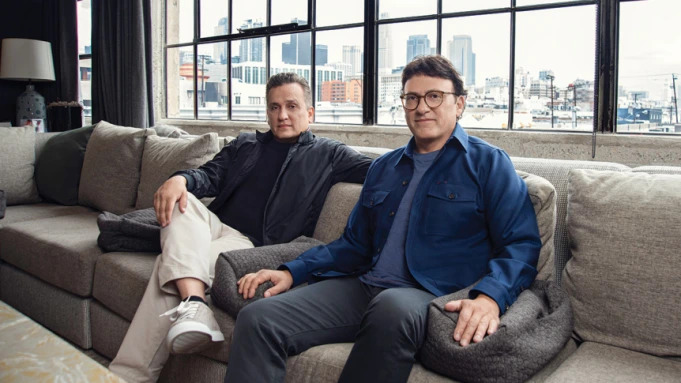
Bringing the phrase “going with your gut” to an altogether new level, Anthony and Joe Russo picked the location of their office for its proximity to pasta. Once regulars at L.A.-based chef Steve Samson’s late Westside outpost Sotto, the duo scored an early invite to his Italian follow-up, Rossoblu, in 2017 — the same year they launched their production banner, AGBO.
“While we had dinner inside this half-finished restaurant, we asked him about the rest of the space,” Joe recalls of their first visit to the sparsely populated development in downtown L.A.’s Fashion District. Five years later, the Cleveland-born brothers’ business, with 40-plus employees, occupies two buildings in the complex totaling over 30,000 square feet. There, upward of 10 miles from Hollywood’s major hubs, the frequent Marvel collaborators have editing suites, screening rooms and a motion-capture stage. They even have plans for the brothers’ favorite Georgia brewery, Creature Comforts, to open an operation downstairs. There has been talks about hosting community events, outdoor screenings and concerts, as well as a theater troupe taking up residence in the office space. Anthony says, “Why we really came down here is you have more of a presence of arts other than film.”
The Russos are no strangers to exponential growth. Moving from indie film (Welcome to Collinwood) to network television (Happy Endings, Arrested Development) to the upper echelons of the Marvel Cinematic Universe (Captain America, two Avengers sequels), the billion-dollar directors are now using their cachet and cash to back projects that range from A24 breakout Everything Everywhere All at Once to their latest directorial effort, the Netflix thriller The Gray Man, which hits the streamer July 22 after a July 15 theatrical bow. (Japanese video game publisher Nexon acquired a 38 percent stake in AGBO in January for $400 million, with a then-reported valuation of $1.1 billion.)0 seconds of 1 minute, 39 secondsVolume 0%
Sitting in the area dubbed “the bro zone”— the room that connects their two offices — in June, the filmmakers offered their thoughts on Netflix’s recent woes, Disney’s new agenda and the “juvenile conversation” around Marvel’s theatrical success.
What was the journey to making The Gray Man?
JOE RUSSO One thing Steven Soderbergh taught us — he was our mentor very early on in our careers — was: “One for you. One for them.” You have to figure out how to make people money. Once you do, you can take some swings. AGBO is really built off of that concept. We started developing The Gray Man while we were making Winter Soldier, not knowing whether we’d continue working with Marvel. We did four Marvel films. Once we came out the other side, we pulled the project out of Sony [where it had gone unproduced since 2014].

The movie is getting a theatrical release before streaming. Was that important for you?
ANTHONY RUSSO This is big cinema. We made it for a theater. That’s how we shot it, how we styled it and, on a technical level, how we supported it. But we like working with new partners. There’s something very energizing about bringing a movie like this out with Netflix. They think about ways of reaching audiences differently.
JOE They’re easier to work with than a traditional studio.
How so?
JOE Their mentality is more the mentality of a tech company than a studio. They’re very hands-off. Nobody bothers you. They have a different approach to how they control the budget on the movie. It’s not as stressful as it is at a studio. There are a lot of positives to working with them. And I’d argue that I think digital distribution has fostered more diversity in the past five years than Hollywood has in a hundred. Because they’re regionally supported, they need to foster connection and talent in those regional markets. Of course, everything’s always driven by money — but that’s an important byproduct of a company like Netflix. Anthony and I are fairly disciplined in being agnostic about presentation. Extraction was watched 100 million times [on Netflix]. That’s the equivalent of a $2 billion movie in theatrical.
When we worked with Marvel, we traveled the world for a decade. What that allows you is an understanding that goes beyond a Hollywood-centric point of view of how to create content. We’re agnostic about delivery. You know what might make everybody happy is Netflix starts doing 45-day windows and they have their giant digital distribution platform. Everybody wins. That feels like where it’s going.

ANTHONY We designed ABGO to be completely independent so that as things evolve and change, we can take any project anywhere, at any time. We have no investment in any of those models.
With the woes Netflix is going through right now, are there implications for the greater industry?ADVERTISING

JOE I don’t think so. They still make billions of dollars. By the way, it’s OK for a company that was flush with cash during the tech spec boom to now be challenged to reconsider its model. And at some point, they have to start moving into what we’re doing — larger IP that can be turned into games and merchandising to build ancillary revenue and build legacy wealth. That’s taking a page out of Disney’s book. But I also think, too, that Disney’s gone very conservative. Post-[Bob] Iger, they seem to be in IP management mode. You’re going to get all the Star Wars and all the Marvel you can handle for the next decade. They’re all changing. It’s either a reinforced conservative approach from your traditional studios or it’s forcing a tech company like Netflix to rethink its entire model.

ANTHONY There’s so much content spread over so many creators and providers that it almost doesn’t matter. If part of the model weakens, there are other parts of the model. [Top Gun: Maverick] is ready and waiting to benefit.
JOE One thing we have never seen before though in this business is Apple and Amazon, which are two trillion-dollar companies that are so wealthy that their investment in entertainment is a rounding error. You have had traditional corporations that look for strategic alliances, like Sony. But these were not companies that had limitless funds. [With them] you’ll probably see the greatest change, but they’re slow moving. Netflix’s survival depends on the amount of content it produces. Apple and Amazon want brand enhancement without brand damage.
AGBO released Everything Everywhere All at Once. Did you finance as well as produce?
JOE We were the seed capital. I fell in love with [Daniel Kwan and Daniel Scheinert’s 2016] Swiss Army Man. Part of what AGBO does, outside of giant IP, is pay back that karmic debt that we owe the universe. It’s highly experimental and has a level of absurdism married to emotion that I hadn’t seen in a while. We thought that if we could help them calibrate it for a slightly wider audience, there could be something really explosive there.
ANTHONY There aren’t a lot of people that could have gotten that movie through the system in the way that we did. That was basically Joe and I believing — and this goes back to our very early conversations with the Daniels — that there may be a film model for them that had a little more commercial dimension to it.
JOE The Daniels are very disciplined filmmakers. They were able to pull that movie off for the kind of budget that I don’t even think that Anthony and I, with 30 years in the business, could figure out how to execute.
What do you want the industry to take away from the success of Everything Everywhere?
ANTHONY The adventurousness of it.
JOE The miracle of Everything Everywhere All at Once is they spent five years working on that film and it’s highly inventive, a highly personal expression, and really interesting use of the two-hour narrative format. But, fuck, there’s not a lot of those left. It’s not an easy kind of film to make. We make movies like The Gray Man so that we can help the Daniels make Everything Everywhere All at Once. The way that Soderbergh made Ocean’s 11 so he could help us make Welcome to Collinwood. You can use business-focused content to support more personal projects.
Marvel has been set up as an industry foil. Is that something you both have noticed?
ANTHONY The overwhelming success of those movies has caused them to represent something that has become “other,” or maybe not attainable to some others for whatever reason. Not every movie has to be liked globally.
JOE When I was 19, I used to love U2. And then they started getting some commercial success, beyond their MTV early days, where they were the biggest band in the world. And I was like, “I hate U2. I’m sick of U2. They’re so ubiquitous!” That was just my ego trying to define myself against the masses. Then, 10 years later, I was like, “I fucking love U2. Why did I do that?” I outgrew it. It feels like a very juvenile conversation. The whole thing feels sad and cynical and pessimistic. You’re talking about movies that 10-year-olds are weeping over and begging to go see. They’ll remember for decades that they were there with their grandfather. Like, give me a fucking break.
As the industry continues to find its way post-Pandemic, what is some ingrained thinking that you would like to see changed or shifted?
ANTHONY Everything. (Laughs.) I hate to be juvenile on that level. We love everything about classic cinema, but we’ve never been precious about that in any way, shape, or form. What has always excited us most is [the question], how do you move it forward? This is part of our philosophy in terms of not being precious about theatrical distribution. How do you get away from the old models? How do you reach audiences that haven’t been engaged before? That’s all the most interesting stuff to us.
JOE Auteur filmmaking is 50 years old at this point. It was conceived in the ’70s. We grew up on that. We were kids, it was really important to us. But we’re also aware that the world needs to change and the more that we try to prevent it from changing the more chaos we create. It’s not anyone’s place to reject the next generation’s ideas. We’re in crisis right now because everyone’s at war with each other. It’s sad to see, as guys who grew up loving film. A thing to remember, too, is it’s an elitist notion to be able to go to a theater. It’s very fucking expensive. So, this idea that was created — that we hang on to — that the theater is a sacred space, is bullshit. And it rejects the idea of allowing everyone in under the tent. Where digital distribution is valuable, other than what I said earlier about how it pushed diversity, is that people can share accounts; they can get 40 stories for the cost of one story. But having some kind of culture war about whether there’s value in that or not is fucking bananas to us.




